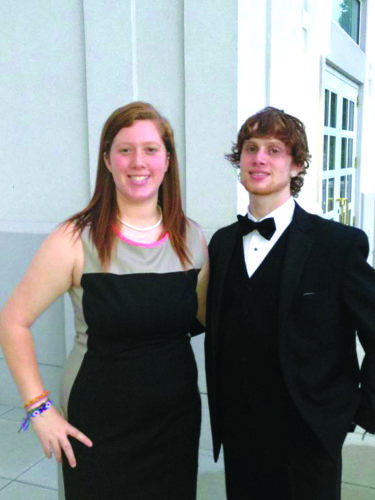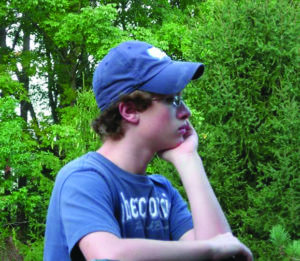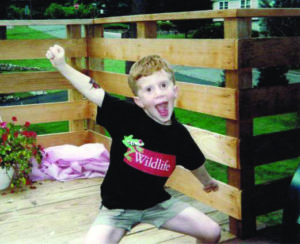
Andrew Grosser and his sister Nicole were splashing in the family pool, while his dad, Perry, sat talking with my brother and me. Years later, I saw him again, when he and his sister were shopping for school supplies in a local store. While I didn’t know him well, I’ve come to learn much about this sensitive, intelligent, soft-spoken young man through his father’s blog, “Never Forget Andrew.”
This ongoing tribute to Dorothy and Perry Grosser’s son and his untimely passing on August 26, 2013–the first day of his senior year at the University of Colorado at Boulder–is a way for Grosser to heal, to memorialize events in his son’s life, and to introduce readers to Andrew’s essence and spirit, yet it has become a great deal more.
Having lost my dad more than three years ago, I can relate to some of the posts, like part of the January 22, 2015, entry:
Moving. What a broad subject. Not moving on, or moving up, or moving others with your words. Just moving. Sometimes we move for work, or for a larger place, or for downsizing. But where I am now, my mental and emotional place in life, moving has different meanings. Moving becomes emotional.
Grosser finds solace for his grief through sharing whatever’s on his mind at any particular time and aims to publish his writings in a book. “Sometimes I feel I want to organize it into chapters according to a particular time or date or event, and then I change my mind,” Grosser said. “Organizing my writings would change the natural flow of the healing process because memories of Andrew come to me in different ways. Putting them in order would change the spontaneity.”
Nicole Grosser feels the blog is a great platform. “It gives everyone a chance to learn more about Andrew,” she said. “It’s usually a trip down memory lane for some memories that I was too young to remember, and a strive to keep Andrew alive with us.” Grieving over the loss of a child is an individualized process, Samantha Schnell LHMC, a licensed psychotherapist in Chappaqua, explained. “Writing is also a singular process and gives a person an opportunity to grieve at his or her own pace.”
It self-soothes as well, Schnell said. “If you feel like you can’t help yourself, then helping someone else, can give you a sense or purpose and help you feel better as you navigate your own grief and connect with people going through the same thing.”
Readership, while varied, has increased steadily. “Each blog produces another 20 to 30 new subscribers,” Grosser said. “When I post a blog, I get about 5,000 to 8,000 hits within a few days, and on average, about 100 to 200 hits per day between posts.” Sometimes people are stuck with thoughts or ideas in their head, he noted, “and the blog lets me verbalize and put into writing how I feel,” Grosser said. “That lets me move past a specific thought, to keep my feet moving forward albeit one step at a time.”
Losing a child challenges the natural expectation that your child will out live you, Schnell said, and while speaking with friends is helpful, some people are uncomfortable discussing death.

It takes away the future and reverses things, and while speaking with friends is helpful, some people are uncomfortable discussing death. “Feelings of grief can be triggered at anytime,” Schnell said. “As time passes, you learn to hold grief in one hand and joy in the other. A parent never wants their child to be forgotten and writing can be a very therapeutic way to honor their memory. A specific conversation or thought can develop into an idea.
“Many times it is what I hear at a group meeting or hear from friend or other bereaved parent,” Grosser said. “Then I sit and write the blog, which helps me get thoughts and ideas off my chest.”
Most of his early readers and subscribers were other bereaved parents, (and) he wrote for that audience. Then, “more and more non-bereaved parents subscribed,” he said. Posts changed “from targeting and talking about bereaved parents to advice and commentary on how others can/should interact with us, what to say and not to say, what we can use help with, and how we feel that others might not understand.”

Thoughts others have and don’t know or think about, Grosser puts into words, including what others said to bereaved parents, the paradox of healing, and Father’s Day. “Other parents tell me I have a putting into words and onto paper what they have in their heads but can’t get out to others,” he said. “Other times posts are for non-bereaved parents: what to say, how to react, how to act.”
Schnell acknowledges that bringing up memories and writing about them can be helpful, noting speaking with a therapist is also important for the healing process. “I like to write about my son; years from now, someone will read about Andrew and learn about him,” Grosser said. “People will know about his love of hockey, his humorous manner, and his ability to be a therapist to so many of his friends. This is usually not the case with most people who have passed.”
To read his poignant writings visit www.neverforgetandrew.com and join the Facebook page Never Forget Andrew.
PHOTOS BY PERRY GROSSER
